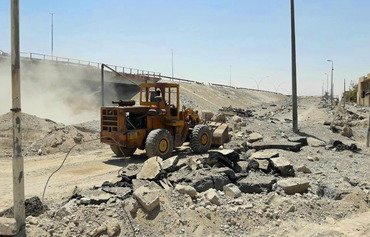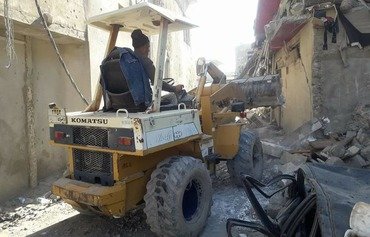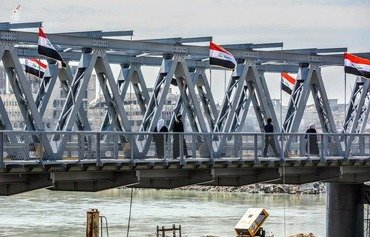The Iraqi government has devised a short-term emergency plan as a first step in repairing the massive destruction the war with the "Islamic State of Iraq and Syria" (ISIS) has caused to western Mosul's infrastructure.
The 100-day plan tackles immediate challenges such as waste removal and the rehabilitation of public service facilities so that basic services can be restored.
It will pave the way for a 10-year reconstruction plan that will include all Iraqi cities liberated from ISIS.
"The short-term plan -- the 100-day plan -- will come into force soon," adviser to the Ninawa governor Duraid Hikmat Tobia told Diyaruna.
"The security forces are still combing buildings and houses in the west of the city to make sure that they are free of terrorists and mines," he said. "Once the area is fully cleared, we will promptly start work."
For the most part, initial rehabilitation efforts will be focused on roads and bridges, as well as water and electricity services, Tobia said.
The projects will be undertaken by Ninawa's local government in co-operation with the Construction and Municipalities Ministry.
They will begin with clearing the explosive remnants of war from roads, reopening them, and repairing vital bridges, especially the city's Old Bridge, also known as the Iron Bridge, Tobia said.
This work is important as it will facilitate the movement of vehicles and equipment required for further reconstruction, he said.
The plan also will address water, power stations and power networks, he said, estimating that 90% of western Mosul has been damaged or destroyed.
"We will need a long time and great efforts to fully reconstruct the city," he said, stressing however that the current plan "is an excellent step to meeting the most pressing needs at the present time".
Over the course of the last six months, western neighborhoods, especially the Old City, witnessed fierce urban warfare that ended with the crushing defeat of ISIS and Iraqi forces in full control of Mosul, he said.
The 100-day plan “treats infrastructure projects that have not been badly damaged in order to restore a minimal reasonable level of basic services", said Ninawa provincial council services committee member Hosam Eddin al-Abbar.
It also will include removing debris and burned vehicles from the streets to enable traffic to resume, he told Diyaruna.
"It is a limited emergency effort, but it is important for restoring the first signs of normal life in those disaster-stricken neighbourhoods," he said.
The damage to private homes is the most severe and requires reconstruction, al-Abbar said, with "Old Mosul alone needing at least 20,000 new housing units".
2018-2027 reconstruction plan
The Ministry of Planning said it has included Mosul and all cities that have been liberated or affected by terrorism in a major reconstruction plan that will kick off next year and continue until 2027.
Ministry spokesman Abdul Zahra al-Hindawi described the 10-year plan as "the largest and most comprehensive" of the ministry's strategic plans.
"The plan will use three integrated tracks to achieve development in affected cities," he told Diyaruna.
"There is a social track that is connected to strengthening the capabilities of all parts of society and taking care of fragile groups that have been burned by ISIS’s fire," he said.
"We have an economic track that is concerned with the advancement of all economic activities," he added, while the third track concerns the reconstruction and reactivation of infrastructure.
The plan has been allocated a $100 billion budget, he added, which will be taken from both the state’s annual budget and from grants and financial aid given to Iraq by donor countries.
Tobia expressed his hope that the donors' conference slated for early 2018 in Kuwait will produce "positive results to help rebuild what the terrorists have destroyed".
"We are waiting for support, and have received signs from many countries that have expressed their willingness to stand with us, which leads us to be optimistic," he said.

![The Iraqi government has launched an emergency 100-day rehabilitation plan to repair western Mosul. [Photo from the Mosul municipality Facebook page]](/cnmi_di/images/2017/07/21/8828-Iraq-Mosul-reconstruction-600_384.jpg)







The Old City has been destroyed in airstrikes and bombings. The people of Old City have been ignored as far as rent is concerned. Until when?
Reply1 Comment(s)